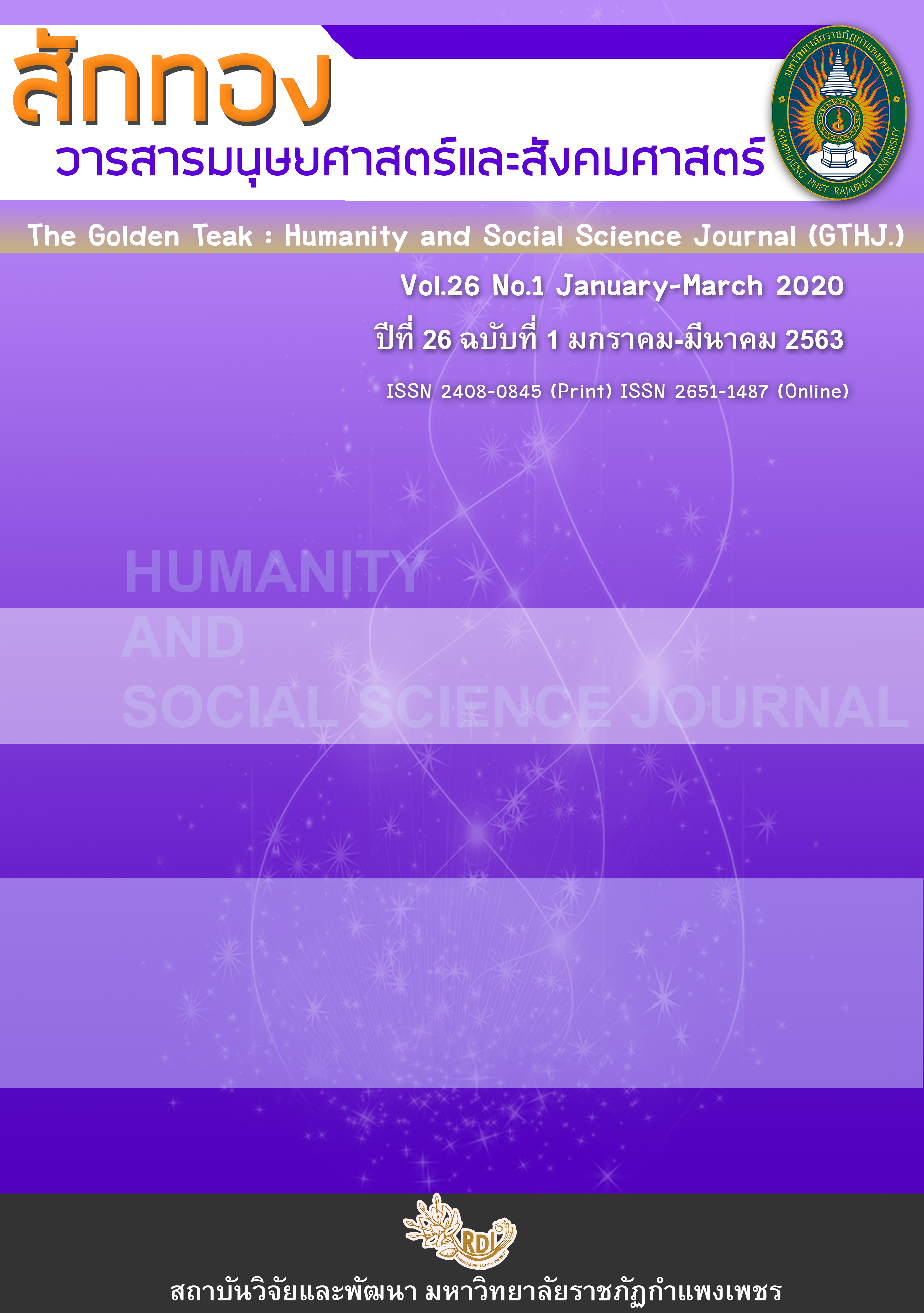Community Learning Process for Driving Community Tourism Development, Case Study of Tha Khoi Community, Bang Ngam Sub-district, Si Prachan District, Suphan Buri Province
Main Article Content
Abstract
The objectives were to: 1. study information of Tha Khoi Community, Bang Ngam Sub-district, Si Prachan District, Suphan Buri Province in term of community tourism development; 2. develop community tourism activities through community learning process, a case study of Tha Khoi Community, Bang Ngam Sub-district, Si Prachan District, Suphan Buri Province. Meantime, this is a mixed methods research. The agricultural tourism resources assessment form was used for compiling quantitative data. The 267 cases of community members assessed themselves. The computer program was applied for data analysis and presented by descriptive statistics including frequency, percentage and mean. The in-dept interview, focus group and participant observation were conducted with 21 cases of community working group for gathering qualitative data. The content analysis method was implemented for data analysis. The quality was verified and assessed by IOC tool and Cronbach's alpha. Moreover, data triangulation was made for several sources. The community study, Nature-based Tourism Site Potential (ENTSP) and Community-based Tourism; CBT) were applied as framework. The findings proved that : Tha Khoi Community was established in the end of Ayutthaya period by King Naresuan before the elephant war with Burma. Presently, it is a famous rice and agricultural cultivation area resulting in community tourism resources related to history and culture of agricultural community. The culture includes historic sites, temples, houses and the agricultural tourism resources comprising agricultural knowledge, rice farming and orchards. The results of potentiality assessment of agricultural tourism sites show that the overall potentiality of tourism sites was high. It is suitable for agricultural community tourism development with various activities under the concept “history village, community market, agricultural road and Thai way”. The activities consist of organic rice, mix farms, zero waste mushroom farming, Adenium breeding, historical learning and five-temple homage river trip. The tourism activities lead to community learning process in term of knowledge, skill and attitude of community members as stakeholders, exchange knowledge, create positive relationship in community and members have more common sense in community development.
Article Details
บทความที่ได้รับการตีพิมพ์เป็นลิขสิทธิ์ของวารสาร สักทอง : วารสารมนุษยศาสตร์และสังคมศาสตร์ สถาบันวิจัยและพัฒนา มหาวิทยาลับราชภัฏกำแพงเพชร
ข้อคิดเห็นใดๆ ที่ปรากฎในวารสารเป็นวรรณกรรมของผู้เขียนโดยเฉพาะ ซึ่งมหาวิทยาลัยราชภัฏกำแพงเพชรและบรรณาธิการไม่จำเป็นต้องเห็นด้วย
References
an Operational Definition. Kasetsart Journal Social Science, 31(2), 280-289.
Chankaew, K. (1996). Principles of watershed management. (2 nd ed.). Bangkok : Department
of Conservation, Faculty of Forestry Kasetsart University.
Chairoj, N. (1998). New Travel Management. TAT Review Magazine, 17(2), 12-18.
Choonwattana, B. (2000). Sustainable tourism development. Bangkok : WordPress.
Department of Tourism. (2015). Tourism Statistics 2015. Bangkok : Ministry of Tourism and Sports.
_______. (2016). Tourism Statistics 2016. Bangkok : Ministry of Tourism and Sports.
_______. (2017). Tourism Statistics 2017. Bangkok : Ministry of Tourism and Sports.
Hansapiromchoke, P. (2017). The Approach for Learning Processes Management for Community Planning. Journal of Education Research, 11(1), 99-109.
Pholanan, T. (2002). Mind Map Work Shop. (2 nd ed.). Bangkok : Buzun centre Thailand.
Rattana, K. (2006). Participatory watershed management. Bangkok : Department of Conservation, Faculty of Forestry Kasetsart University.
Tavorn, C. (2013). Social Power of Communities in Mangrove Forest Management, Paklok Bay, Phuket Province, Thailand. Thesis of Doctor degree of Philosophy in Sociology, Khon Kaen University, Khon Kaen.
Tourism Authority of Thailand. (2002). Development and tryout of a tourist's manual on the cultural heritage. Bangkok : Ministry of Tourism and Sports.
Wanichritta, T. (2007). Knowledge management in community : a case study of ecotourism management by participation of the community, samut Songkhram province. Thesis of Master of Education, Silpakorn University.


